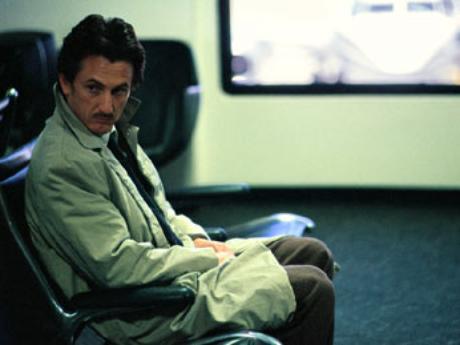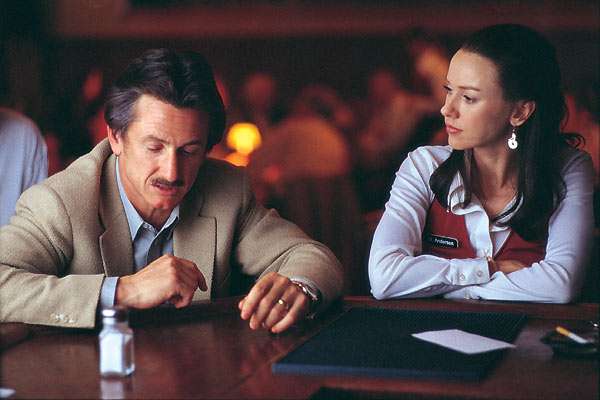Beware the finger of death, Confederate conspirators. Former fugitive, scoundrel, and president Harrison Ford is slated to track down Lincoln’s assassin in the forthcoming film Manhunt. Ford will play Everett Conger, the retired cavalry officer who helped catch John Wilkes Booth at the Garrett farm, near Port Royal, Virginia, twelve days after Lincoln’s shooting.
Tag: Assassins
Death of a Salesman.

Then again, Samuel Byck wasn’t like most people either…in fact, that may be the biggest problem with this otherwise haunting film. Played for laughs in the Sondheim Assassins, Byck here is portrayed as a beaten-down American Everyman of the Willy Loman/Travis Bickle school, albeit one with a Pulp Fiction-like problem with authority and a frozen run of luck like you read about. But, while the film’s hold lies in Sean Penn’s powerful portrayal of a down-on-his-heels, borderline-stable guy who gets one too many doors slammed in his face (to Penn’s credit, his performance never really feels like a stunt, as it might have with a lesser actor), the real Samuel Byck was an even stranger bird than this film lets on. For example, there’s no mention of Byck’s protesting outside the White House in a Santa suit here, and the whole tapes-to-Leonard-Bernstein angle is played as straight as it possibly can be.
But, historical veracity aside, The Assassination of Richard Nixon still makes for a grim and compelling 90 minutes of darkening gloom, anchored by Sean Penn’s slow, fidgety burn. (Watts, Don Cheadle, Michael Wincott, and Jack Thompson all do good character work here, but the film is Penn’s, and he’s the only one to leave a mark.) The movie’s unrelenting downward trajectory is clear from the opening titles, and the final scene at BWI airport probably played a few minutes too long, particularly as Byck awaits boarding for his final destination. All in all, though, The Assassination of Richard Nixon is a somber inquiry into a life of quiet desperation, and a sad reminder that, regardless of what our American dream may promise, there are no guarantees in this world, and all too often no respite for the damned.

Lemony Snicket, Sour Byck.
In today’s movie bin, a post-Eternal Sunshine Jim Carrey returns to hamming it up in the full trailer for Lemony Snicket’s A Series of Unfortunate Events, and Sean Penn (with the aid of 21 Grams co-star Naomi Watts and Don Cheadle) resurrects Samuel Byck (also featured in Stephen Sondheim’s Assassins) in the international teaser for The Assassination of Richard Nixon.
Sympathy for the Devils.
 The mystery of the grassy knoll has finally been solved, and the second shooter was…John Wilkes Booth?! For the first time in an age, I took advantage of the New York theater scene last night and caught the much-heralded revival of Stephen Sondheim’s Assassins at the Roundabout Theatre, which chronicles the inner demons of Mssrs. Booth, Oswald, Hinckley, and assorted other murderers and would-be-murderers of presidents. All in all, I’d say I enjoyed it, although it took a musical number or two for me to warm to the material (some never made the leap — the guy next to me left outraged.) And there’s some memorable performances here, particularly Denis O’Hare as Charles Guiteau (Garfield’s assassin) and Michael Cerveris as Booth.
The mystery of the grassy knoll has finally been solved, and the second shooter was…John Wilkes Booth?! For the first time in an age, I took advantage of the New York theater scene last night and caught the much-heralded revival of Stephen Sondheim’s Assassins at the Roundabout Theatre, which chronicles the inner demons of Mssrs. Booth, Oswald, Hinckley, and assorted other murderers and would-be-murderers of presidents. All in all, I’d say I enjoyed it, although it took a musical number or two for me to warm to the material (some never made the leap — the guy next to me left outraged.) And there’s some memorable performances here, particularly Denis O’Hare as Charles Guiteau (Garfield’s assassin) and Michael Cerveris as Booth.
Still, the basic (and ahistorical) message of the play — that all assassins, whatever their surface motives, are just looking for a little happiness, a little love, and a little fame — was encapsulated much more succinctly by Peter Gabriel’s excellent “Family Snapshot” two decades ago. And, while I like that song and admire what this play was trying to be, this “everybody needs a hug” thesis is too reductively simplistic. Notwithstanding freak shows like Hinckley, assassination is by its very definition a political act, as is distressingly obvious to all of us given recent events in the Middle East. Sure, a lot of assassins are flat-out crazies…Hinckley, Mark David Chapman, Sirhan Sirhan. But others — Booth, Guiteau, Leon “McKinley” Czolgosz, James Earl Ray, Brutus — had a political agenda in mind that can’t be explained solely by “bad reviews” or a lack of affection as a child (which is perhaps why the Sondheim play ignores the Stalwart v. Halfbreed internecine strife propelling Guiteau to his foul deed.)

